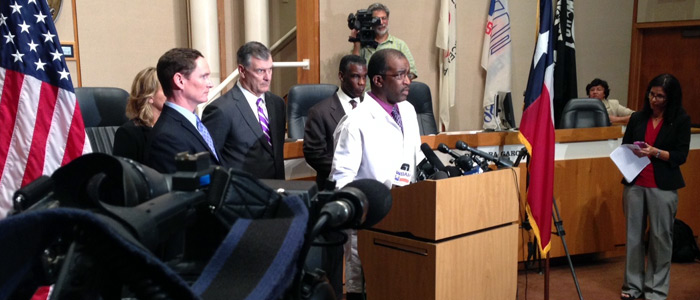When Ebola came to Dallas, UNTHSC alum was prepared
February 2, 2015 • Uncategorized
As Medical Director/Health Authority for Dallas County, Christopher Perkins, DO, MPH, has led surveillance efforts for communicable diseases ranging from measles to West Nile virus.
But when the first U.S diagnosed case of Ebola virus occurred in Dallas, the UNT Health Science Center alumnus saw his job veer into uncharted territory.
“It was surprising to get the first case of Ebola in North America, but we were ready,” Dr. Perkins said. “Our first reaction was to immediately get busy to stop the virus from spreading.”
To accomplish that, Dr. Perkins oversaw Dallas County public health workers who performed contact tracing, a process that identifies and locates every person who came in contact with an ill Ebola patient. Those contacts were monitored for signs of illness for 21 days. In this case, Dallas County epidemiologists and communicable disease staff completed surveillance on 177 residents in the county.
That took considerable effort.
“Our days turned into nights, and our nights turned into days, but we were prepared to handle it,” Dr. Perkins said.
“The actions we took with Ebola are no different from the methods we use for every other communicable disease,” he added. “No matter the pathogen, our approach remains the same.”
One of Dr. Perkins’ primary duties was communicating important information with the media, public, health care personnel, and elected officials, including then-Gov. Rick Perry and city council members from various municipalities. Among his top priorities was controlling hysteria by providing scientific facts.
“It was important to keep a consistent message – unless you have been in direct contact with bodily fluids of someone who is infected with the virus and having symptoms, you are not at risk,” he said. “Once we were able to communicate that message, I believe it helped allay fears so people could carry on with their daily lives.”
In the end, two health care workers became sick with the virus but survived. The initial patient died. On Nov. 7, Dallas was officially declared “Ebola free.”
“The Ebola crisis taught us two things. First of all, we must have adequate funding to support our public health infrastructure,” Dr. Perkins said. “The other is that local public health professionals should always be ready for the unexpected.”


Social media